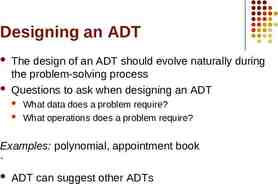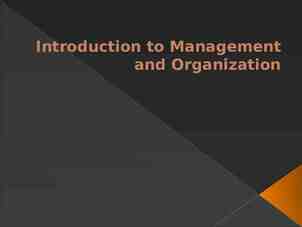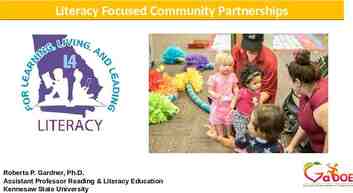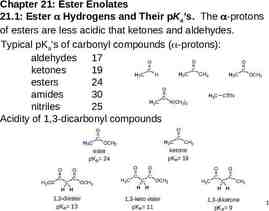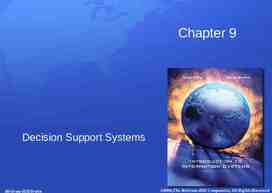Georgia’s Government JUDICIAL BRANCH Presentation, Graphic Organizers,
77 Slides5.52 MB

Georgia’s Government JUDICIAL BRANCH Presentation, Graphic Organizers, & Activities

STANDARDS: SS8CG4 The student will analyze the role of the judicial branch in Georgia state government. a. Explain the structure of the court system in Georgia including trial and appellate procedures and how judges are selected. b. Explain the difference between criminal law and civil law. c. Describe the adult justice system, emphasizing the different jurisdictions, terminology, and steps in the criminal justice process. d. Describe ways to avoid trouble and settle disputes peacefully. e. Evaluate how the judicial branch fulfills its role in interpreting the laws of Georgia and ensuring justice Brain Wrinkles

TEACHER INFO: CLOZE Notes The next pages are handouts for the students to use for note-taking during the presentation. (Print front to back to save paper and ink.) Check the answers as a class after the presentation. Brain Wrinkles

JUDICIAL BRANCH CLOZE Notes 1 Judicial Branch This branch and makes sure that they are applied properly and uphold the constitution. The make up the judicial branch of Georgia’s government. Georgia has two main kinds of courts: . Georgia’s court system is organized into with 2 appellate-level courts and 5 trial-level courts. Appellate Courts The appellate courts look over judgements made by lower courts and . They from lower courts rather than trying cases for the first time. Appellate courts make sure that and do not go against Georgia’s Constitution. There are in Georgia: the Supreme Court and the Court of Appeals. 1. Supreme Court: and is made up of 7 justices elected to six-year terms. Georgia’s Supreme Court may hear cases involving the constitutionality of a law, disputes over elections, (all), titles to land, etc. 2. : Second highest court in the state and is made up of 12 judges who work in panels of three to hear cases. Trial Courts In trial courts, peoples’ actions are . The actions can be judged in one of two ways: by a , or simply by a judge. Trial courts hear and try cases for the . The are: superior, state, juvenile, probate, and magistrate courts. 1. Superior Courts: Can hear almost ; have a judge and jury 2. State Courts: Have jurisdiction over and civil cases; have a judge and jury 3. Juvenile Courts: Have jurisdiction over delinquent and deprived children under 18; no jury 4. Probate Courts: Handle such as will and administration of estates; may have a jury 5. Magistrate Courts: Handle small civil claims of 15,000 or less, , arrest warrants, etc.; no jury Brain Wrinkles

JUDICIAL BRANCH CLOZE Notes 2 Judges Georgia’s judges are either . Judges in the Supreme Court, Court of Appeals, superior, state, and probate courts are at the state, local, and county level. Most magistrate judges are elected, but some are appointed by . Juvenile court judges are appointed by . 2 Types of Law Trial courts oversee cases dealing with the two types of law . Criminal law deals with and society. Ex: murder, robbery, DUI Civil law where one person or group says that another person or group has somehow done them wrong. Ex: divorce, contracts, property ownership, injuries. Criminal Law A criminal case is , who claims that a person or group has committed a crime. The government‘s prosecuting attorney seeks to or jury that the defendant (person accused) both committed a crime and wanted to commit the crime. The defendant has a to defend himself. If the defendant is of breaking the law, he can be punished by being put in jail or made to pay a fine, or both. Criminal law defines . Crimes for which the punishment is less than a year in jail are called . Crimes with punishments of one year or more in jail are more serious and are called . Guilt is harder to prove in a criminal case because the prosecutor must prove that the defendant is guilty “ ”. Civil Law A civil case is introduced by a private party (plaintiff) . The plaintiff brings their complaint to the court’s attention and tries to convince either a judge or a jury that their . The defendant may be . If the plaintiff proves guilt of the other party by a “preponderance of evidence”, then the defendant may have to Brain Wrinkles

JUDICIAL BRANCH CLOZE Notes 3 Jurisdiction Jurisdiction is the power, right, or authority to . Georgia’s adult justice system consists of courts of of jurisdiction: general, limited, and appellate. General Jurisdiction Georgia’s general jurisdiction trial court is the . , felony cases, and divorce are all handled by the superior court. Limited Jurisdiction The three limited jurisdiction courts are state trial courts, , and magistrate courts. State trial courts exercise limited jurisdiction over misdemeanor criminal cases, such as , and civil cases. Probate trial courts exercise limited jurisdiction over , wills, guardianships, and estates. These courts also supervise election ballot printing and . Magistrate courts exercise limited jurisdiction over minor civil claims, bad checks, arrest and search warrants, and . These courts . Appellate Jurisdiction The two appellate jurisdiction courts are the and the Supreme Court. Neither court holds jury trials or hears new material as all cases have been . The Court of Appeals has jurisdiction over courts in the adult justice system. It hears appeals for civil claims for , damages, and criminal cases (except felonies). Court has jurisdiction over appeals related to wills, Brain Wrinkles The Supreme

JUDICIAL BRANCH CLOZE Notes 4 1. Arraignment A suspect has his first court appearance between after an arrest. The involved and decides whether or not there is probable cause for the arrest. The suspect is r under Georgia law. During the arraignment, the suspect can have a lawyer, but on his behalf at this point. 2. Bail Bail is set if the in nature or if the suspect is not likely to run away. The suspect can go about his daily business until his . If the suspect is out on bail, but does not return when scheduled, a for his arrest and he will be put in jail. If bail is not set, or he is unable to pay the bail, the suspect is until the court date. 3. Commitment Hearing If the suspect pleads “not guilty” to the charges when asked by the judge, it is the state prosecutor’s job to show that there is “probable cause” that a . If the judge decides that there isn’t enough evidence, the . If there is enough evidence, the judge will . 4. Preparing for Trial During this step, both sides, the defense (for the suspect) and the prosecution (for the state), . The during this time. Continuances, or postponements, might be filed during this time, and a can be set. 5. Plea Bargaining The prosecution sometimes offers a to the suspect. If the defense accepts the plea bargain, the suspect agrees to plead “guilty” in exchange for a and there would be no trial. If the defense feels they have a strong case, they do and the trial date stands as is. 6. The Trial Both the prosecution and defense at the trial. It is up to the prosecution to beyond a reasonable doubt that a crime was committed. The defense tries to make the jury of the accused. Brain Wrinkles

JUDICIAL BRANCH CLOZE Notes 5 Avoid Trouble There are and stay out of the criminal justice system: Choose friends with similar to your own. and alcohol. at home, school, and in the community. Can you think of other ways to avoid trouble? Settle Disputes In order to , there are many things that you can do: Respect other and their opinions. Never let a disagreement ask someone else (a mediator) to help resolve the conflict. Try to see the person’s point of view and be . Interpreting Law It is the role of Georgia’s judges to interpret and to individual cases and circumstances. One way that the judicial branch fulfills its role is that the Supreme Court may rule that a law passed by the legislative branch is . Also, when a state law is unclear, the Supreme Court has the of the law. This is an by the judiciary branch on the other two branches of government. Ensuring Justice The judicial branch is charged with under the law for all of Georgia’s citizens, and for of the law. It is responsible for ensuring justice in our legal system by making sure that , deciding guilt or innocence in a fair manner, and designating punishment that fits the crime. Brain Wrinkles

JUDICIAL BRANCH CLOZE Notes 1 KEY Judicial Branch This branch interprets the state’s laws and makes sure that they are applied properly and uphold the constitution. The state’s courts make up the judicial branch of Georgia’s government. Georgia has two main kinds of courts: trial courts and appellate courts. Georgia’s court system is organized into seven levels with 2 appellate-level courts and 5 trial-level courts. Appellate Courts The appellate courts look over judgements made by lower courts and handles their appeals. They only hear cases appealed from lower courts rather than trying cases for the first time. Appellate courts make sure that trials are fair and do not go against Georgia’s Constitution. There are two types of appellate courts in Georgia: the Supreme Court and the Court of Appeals. 1. Supreme Court: Highest court in the state and is made up of 7 justices elected to six-year terms. Georgia’s Supreme Court may hear cases involving the constitutionality of a law, disputes over elections, death penalty convictions (all), titles to land, etc. 2. Court of Appeals: Second highest court in the state and is made up of 12 judges who work in panels of three to hear cases. Trial Courts In trial courts, peoples’ actions are measured against the law. The actions can be judged in one of two ways: by a group of citizens called a jury, or simply by a judge. Trial courts hear and try cases for the first time. The five trial-level courts are: superior, state, juvenile, probate, and magistrate courts. 1. Superior Courts: Can hear almost any civil or criminal case; have a judge and jury 2. State Courts: Have jurisdiction over misdemeanor violations and civil cases; have a judge and jury 3. Juvenile Courts: Have jurisdiction over delinquent children under 17 and deprived children under 18; no jury 4. Probate Courts: Handle administrative matters such as will and administration of estates; may have a jury 5. Magistrate Courts: Handle small civil claims of 15,000 or less, bad checks, arrest warrants, etc.; no jury Brain Wrinkles

JUDICIAL BRANCH CLOZE Notes 2 KEY Judges Georgia’s judges are either elected or appointed. Judges in the Supreme Court, Court of Appeals, superior, state, and probate courts are elected to their positions at the state, local, and county level. Most magistrate judges are elected, but some are appointed by local legislators. Juvenile court judges are appointed by superior court judges. 2 Types of Law Trial courts oversee cases dealing with the two types of law—criminal law and civil law. Criminal law deals with actions that harm people and society. Ex: murder, robbery, DUI Civil law handles private disputes where one person or group says that another person or group has somehow done them wrong. Ex: divorce, contracts, property ownership, injuries. Criminal Law A criminal case is introduced by the government, who claims that a person or group has committed a crime. The government‘s prosecuting attorney seeks to convince the judge or jury that the defendant (person accused) both committed a crime and wanted to commit the crime. The defendant has a right to testify to defend himself. If the defendant is found guilty of breaking the law, he can be punished by being put in jail or made to pay a fine, or both. Criminal law defines two classes of crimes. Crimes for which the punishment is less than a year in jail are called misdemeanors. Crimes with punishments of one year or more in jail are more serious and are called felonies. Guilt is harder to prove in a criminal case because the prosecutor must prove that the defendant is guilty “beyond a reasonable doubt”. Civil Law A civil case is introduced by a private party (plaintiff) seeking monetary damages. The plaintiff brings their complaint to the court’s attention and tries to convince either a judge or a jury that their complaint has a real basis. The defendant may be forced to testify. If the plaintiff proves guilt of the other party by a “preponderance of evidence”, then the defendant may have to pay money to the plaintiff. Most civil cases are resolved out of court, and people found guilty in civil cases never have to go to jail. Brain Wrinkles

JUDICIAL BRANCH CLOZE Notes 3 KEY Jurisdiction Jurisdiction is the power, right, or authority to interpret and apply the law. Georgia’s adult justice system consists of courts of three different types of jurisdiction: general, limited, and appellate. General Jurisdiction Georgia’s general jurisdiction trial court is the superior court. Land disputes, felony cases, and divorce are all handled by the superior court. Limited Jurisdiction The three limited jurisdiction courts are state trial courts, probate trial courts, and magistrate courts. State trial courts exercise limited jurisdiction over misdemeanor criminal cases, such as traffic violations, and civil cases. Probate trial courts exercise limited jurisdiction over marriage licenses, wills, guardianships, and estates. These courts also supervise election ballot printing and vote counting. Magistrate courts exercise limited jurisdiction over minor civil claims, bad checks, arrest and search warrants, and ordinance violations. These courts do not have jury trials. Appellate Jurisdiction The two appellate jurisdiction courts are the Court of Appeals and the Supreme Court. Neither court holds jury trials or hears new material as all cases have been heard in lower courts. The Court of Appeals has jurisdiction over appeals from superior and state courts in the adult justice system. It hears appeals for civil claims for child custody cases, damages, and criminal cases (except felonies). The Supreme Court has jurisdiction over appeals related to wills, divorce, and cases where a sentence of death was or may be given. Brain Wrinkles

JUDICIAL BRANCH CLOZE Notes 4 KEY 1. Arraignment A suspect has his first court appearance between 24 and 48 hours after an arrest. The judge reviews circumstances involved and decides whether or not there is probable cause for the arrest. The suspect is read his rights under Georgia law. During the arraignment, the suspect can have a lawyer, but no evidence is presented on his behalf at this point. 2. Bail Bail is set if the crime is non-violent in nature or if the suspect is not likely to run away. The suspect can go about his daily business until his court date. If the suspect is out on bail, but does not return when scheduled, a warrant is issued for his arrest and he will be put in jail. If bail is not set, or he is unable to pay the bail, the suspect is held in jail until the court date. 3. Commitment Hearing If the suspect pleads “not guilty” to the charges when asked by the judge, it is the state prosecutor’s job to show that there is “probable cause” that a crime was committed. If the judge decides that there isn’t enough evidence, the case may be dropped. If there is enough evidence, the judge will set a trial date. 4. Preparing for Trial During this step, both sides, the defense (for the suspect) and the prosecution (for the state), gather evidence. The jurors are also chosen during this time. Continuances, or postponements, might be filed during this time, and a new trial date can be set. 5. Plea Bargaining The prosecution sometimes offers a plea bargain to the suspect. If the defense accepts the plea bargain, the suspect agrees to plead “guilty” in exchange for a lighter sentence and there would be no trial. If the defense feels they have a strong case, they do not accept the plea and the trial date stands as is. 6. The Trial Both the prosecution and defense argue their cases at the trial. It is up to the prosecution to prove to the jury beyond a reasonable doubt that a crime was committed. The defense tries to make the jury doubt the guilt of the accused. The defendant may be found guilty of all, some, or none of the charges. Brain Wrinkles

JUDICIAL BRANCH CLOZE Notes 5 KEY Avoid Trouble There are many ways to avoid trouble and stay out of the criminal justice system: Choose friends with morals and values similar to your own. Avoid drugs and alcohol. Obey rules at home, school, and in the community. Can you think of other ways to avoid trouble? write own examples Settle Disputes In order to settle disputes peacefully, there are many things that you can do: Respect other people’s differences and their opinions. Never let a disagreement grow into violence—ask someone else (a mediator) to help resolve the conflict. Try to see the person’s point of view and be willing to compromise. Interpreting Law It is the role of Georgia’s judges to interpret and apply state laws to individual cases and circumstances. One way that the judicial branch fulfills its role is that the Supreme Court may rule that a law passed by the legislative branch is unconstitutional. Also, when a state law is unclear, the Supreme Court has the final say about the meaning of the law. This is an important check by the judiciary branch on the other two branches of government. Ensuring Justice The judicial branch is charged with ensuring equal protection under the law for all of Georgia’s citizens, and for enforcing the rule of the law. It is responsible for ensuring justice in our legal system by making sure that laws are constitutional, deciding guilt or innocence in a fair manner, and designating punishment that fits the crime. Brain Wrinkles

Georgia’s Government JUDICIAL BRANCH Brain Wrinkles

Judicial Branch This branch interprets the state’s laws and makes sure that they are applied properly and uphold the constitution. The state’s courts make up the judicial branch of Georgia’s government. Georgia has two main kinds of courts: trial courts and appellate courts. Georgia’s court system is organized into seven levels with 2 appellate-level courts and 5 trial-level courts.

Brain Wrinkles

Appellate Courts The appellate courts look over judgements made by lower courts and handles their appeals. They only hear cases appealed from lower courts rather than trying cases for the first time. Appellate courts make sure that trials are fair and do not go against Georgia’s Constitution. There are two types in Georgia: the Supreme Court and the Court of Appeals.

Appellate Courts 1. Supreme Court: Highest court and is made up of 7 justices elected* to six-year terms. Georgia’s Supreme Court may hear cases involving the constitutionality of a law, disputes over elections, death penalty convictions (all), titles to land, etc. 2. Court of Appeals: Second highest court in the state and is made up of 12 judges who work in panels of three to hear cases.

Georgia State Supreme Court Building Brain Wrinkles

Trial Courts In trial courts, peoples’ actions are measured against the law. The actions can be judged in one of two ways: by a group of citizens (jury), or simply by a judge. Trial courts hear and try cases for the first time. The five trial-level courts are: superior, state, juvenile, probate, and magistrate courts.

Trial Courts 1. Superior Courts: Can hear almost any civil or criminal case; have a judge and jury 2. State Courts: Have jurisdiction over misdemeanor violations and civil cases; have a judge and jury 3. Juvenile Courts: Have jurisdiction over delinquent children under 17 and deprived children under 18; no jury* 4. Probate Courts: Handle administrative matters such as wills and administration of estates; may have a jury 5. Magistrate Courts: Handle small civil claims of 15,000 or less, bad checks, arrest warrants, etc.; no jury*

Review What is the difference between trial and appellate courts?

Brain Wrinkles

Judges Georgia’s judges are either elected or appointed. Judges in the Supreme Court, Court of Appeals, superior, state, and probate courts are elected to their positions at the state, local, and county level. Most magistrate judges are elected, but some are appointed by local legislators. Juvenile court judges are appointed by superior court judges.

Chief Judge of the Georgia Court of Appeals in the court’s Atlanta courtroom Brain Wrinkles

Two Types of Law: CRIMINAL & CIVIL Brain Wrinkles

2 Types of Law Trial courts oversee cases dealing with the two types of law—criminal law and civil law. Criminal law deals with actions that harm people and society. Ex: murder, robbery, DUI Civil law handles private disputes where one person or group says that another person or group has somehow
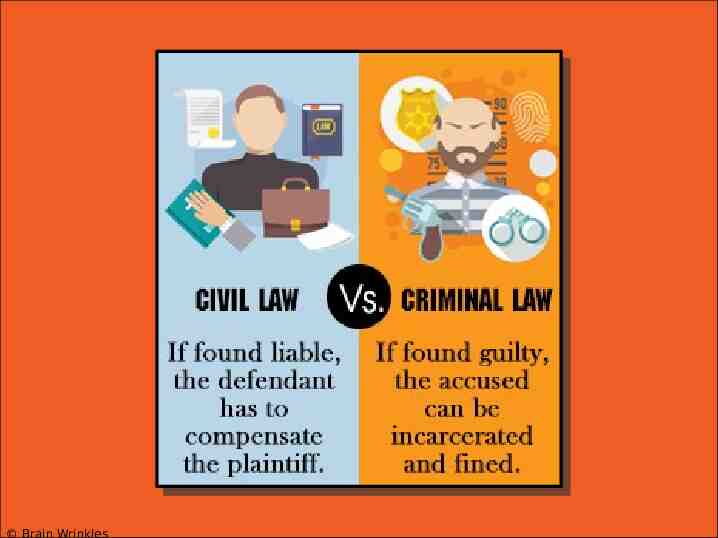
Brain Wrinkles

Criminal Law A criminal case is introduced by the government, who claims that a person or group has committed a crime. The government‘s prosecuting attorney seeks to convince the judge or jury that the defendant (person accused) both committed a crime and wanted to commit the crime. The defendant has a right to testify to defend himself. If the defendant is found guilty of breaking the law, he can be punished by being put in

Criminal Law Criminal law defines two classes of crimes. Crimes for which the punishment is less than a year in jail are called misdemeanors. Crimes with punishments of one year or more in jail are more serious and are called felonies. Guilt is harder to prove in a criminal case
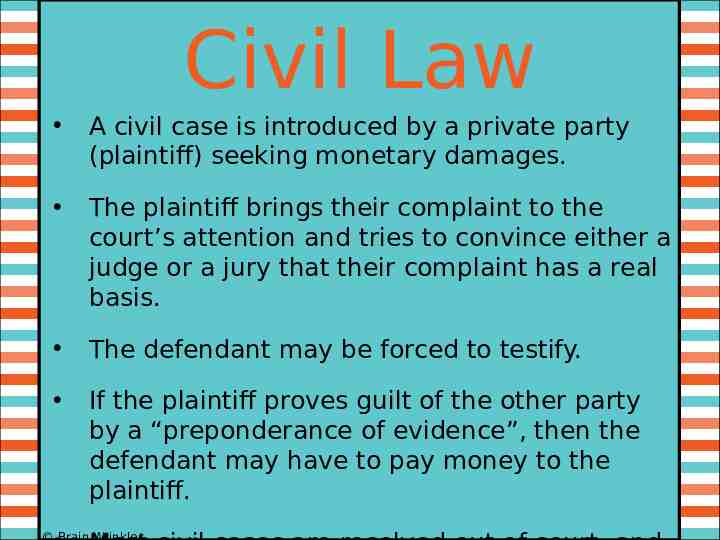
Civil Law A civil case is introduced by a private party (plaintiff) seeking monetary damages. The plaintiff brings their complaint to the court’s attention and tries to convince either a judge or a jury that their complaint has a real basis. The defendant may be forced to testify. If the plaintiff proves guilt of the other party by a “preponderance of evidence”, then the defendant may have to pay money to the plaintiff.
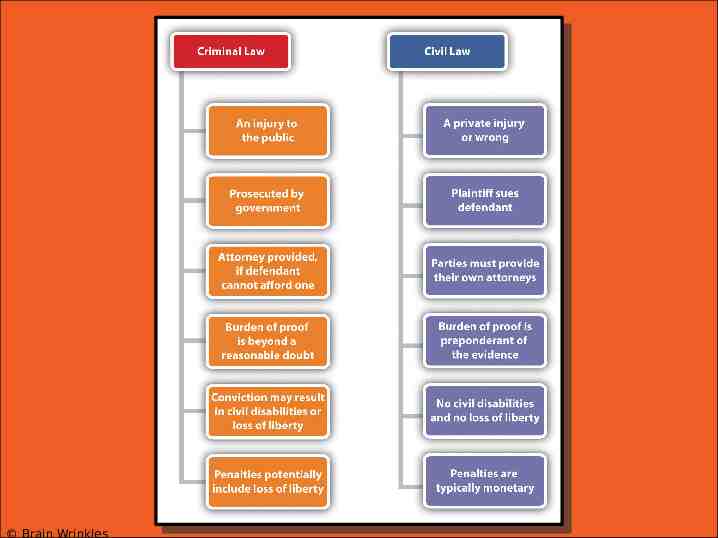
Brain Wrinkles
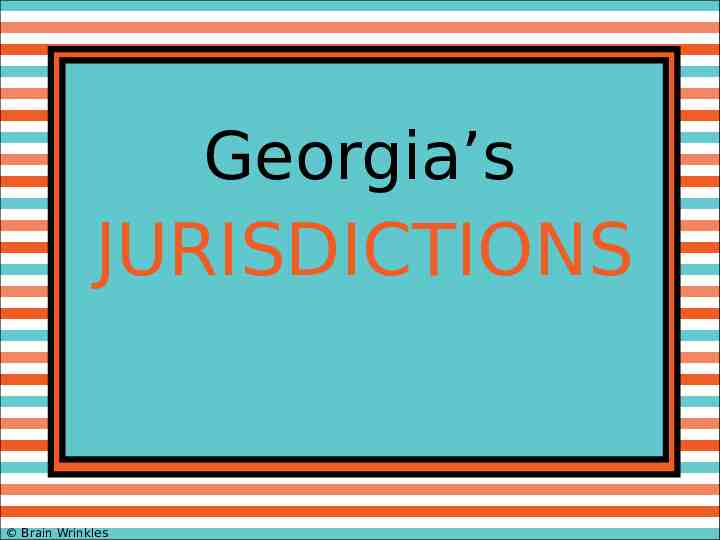
Georgia’s JURISDICTIONS Brain Wrinkles
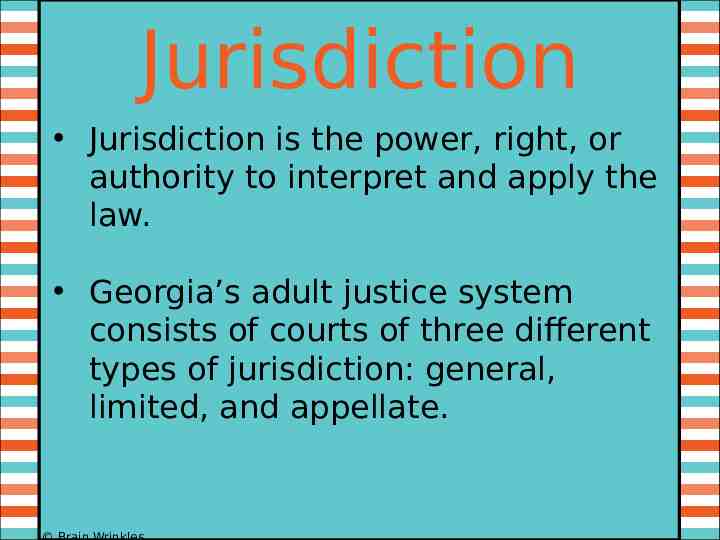
Jurisdiction Jurisdiction is the power, right, or authority to interpret and apply the law. Georgia’s adult justice system consists of courts of three different types of jurisdiction: general, limited, and appellate.
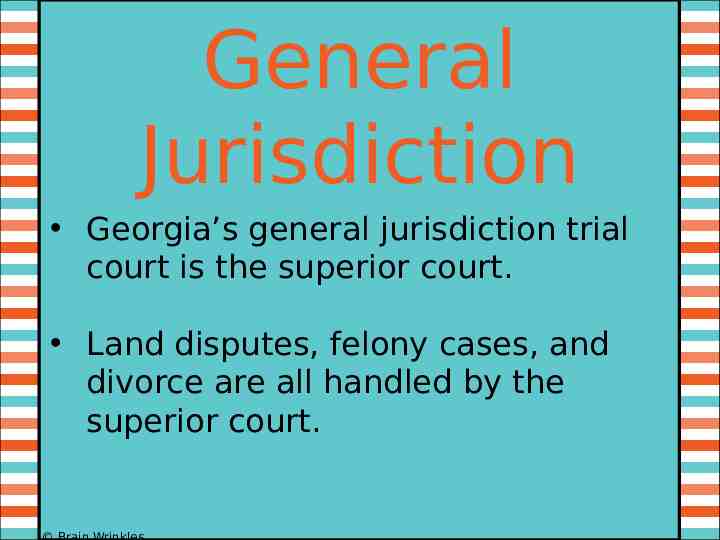
General Jurisdiction Georgia’s general jurisdiction trial court is the superior court. Land disputes, felony cases, and divorce are all handled by the superior court.
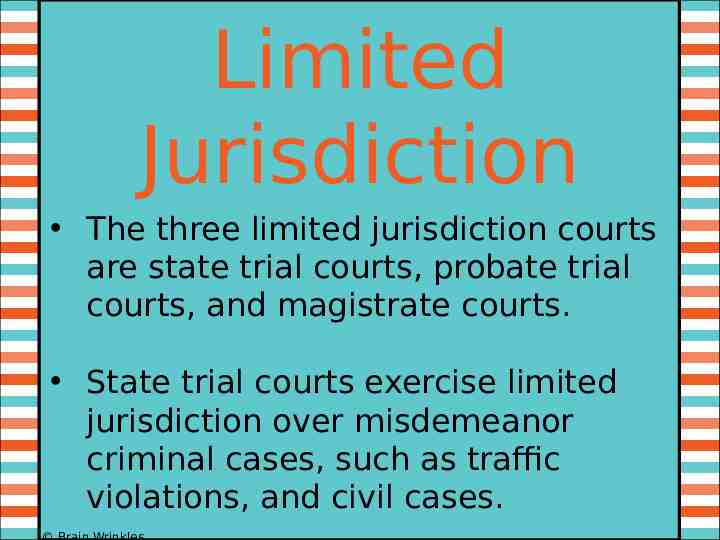
Limited Jurisdiction The three limited jurisdiction courts are state trial courts, probate trial courts, and magistrate courts. State trial courts exercise limited jurisdiction over misdemeanor criminal cases, such as traffic violations, and civil cases.
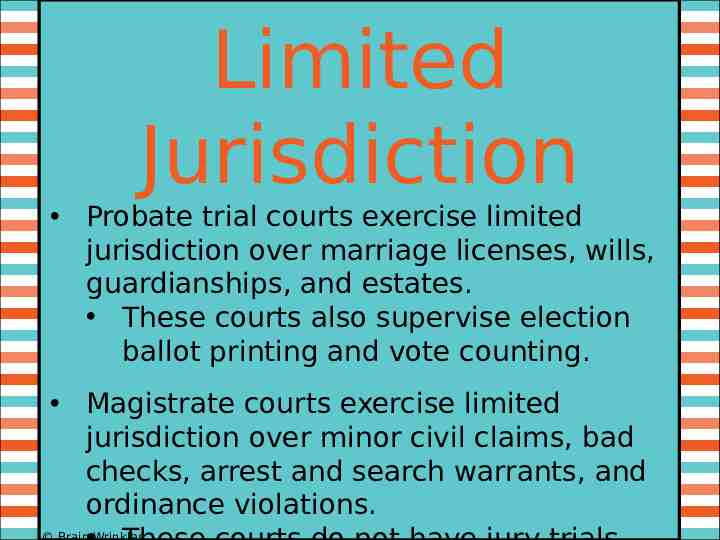
Limited Jurisdiction Probate trial courts exercise limited jurisdiction over marriage licenses, wills, guardianships, and estates. These courts also supervise election ballot printing and vote counting. Magistrate courts exercise limited jurisdiction over minor civil claims, bad checks, arrest and search warrants, and ordinance violations.
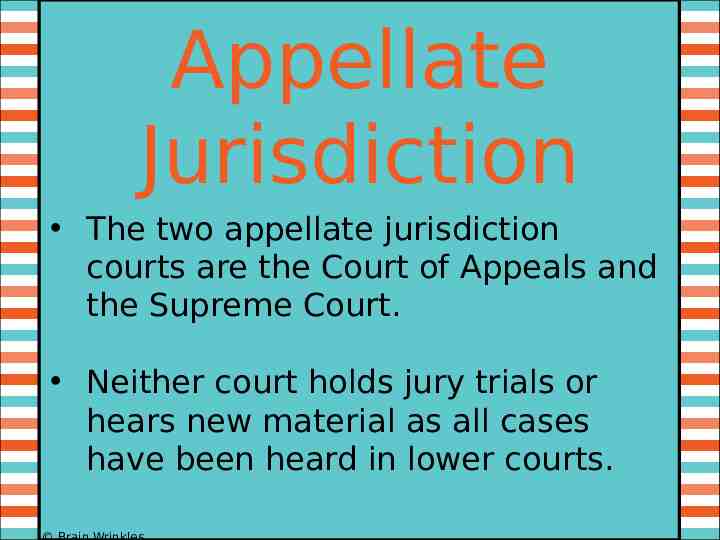
Appellate Jurisdiction The two appellate jurisdiction courts are the Court of Appeals and the Supreme Court. Neither court holds jury trials or hears new material as all cases have been heard in lower courts.
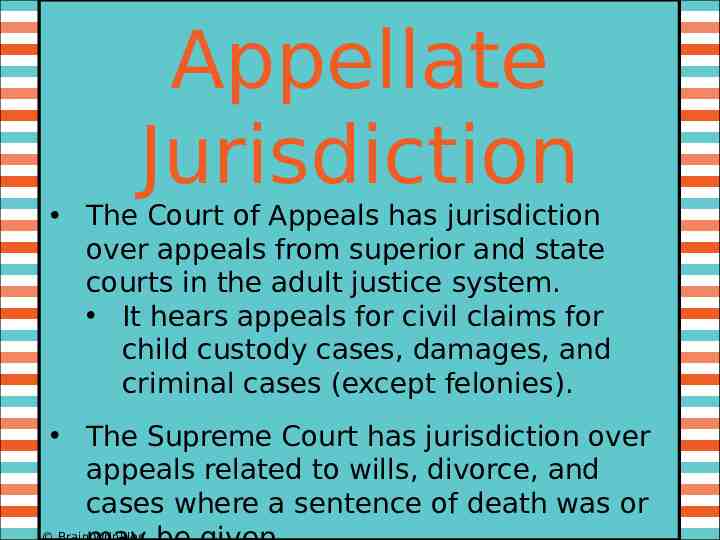
Appellate Jurisdiction The Court of Appeals has jurisdiction over appeals from superior and state courts in the adult justice system. It hears appeals for civil claims for child custody cases, damages, and criminal cases (except felonies). The Supreme Court has jurisdiction over appeals related to wills, divorce, and cases where a sentence of death was or
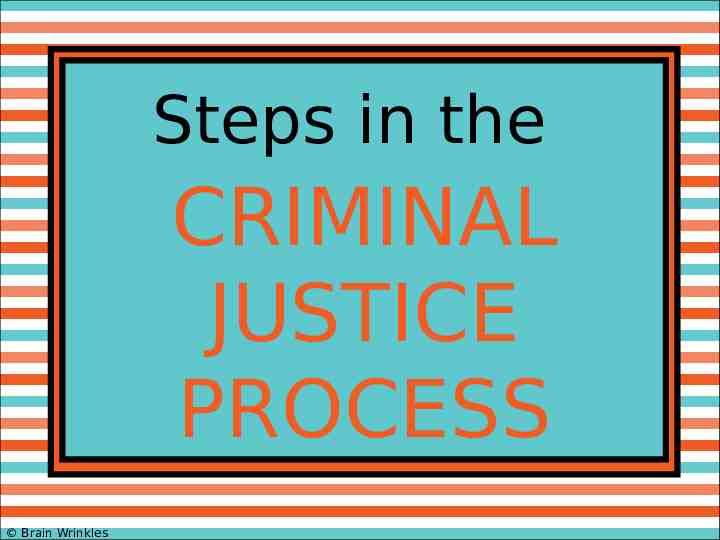
Steps in the CRIMINAL JUSTICE PROCESS Brain Wrinkles
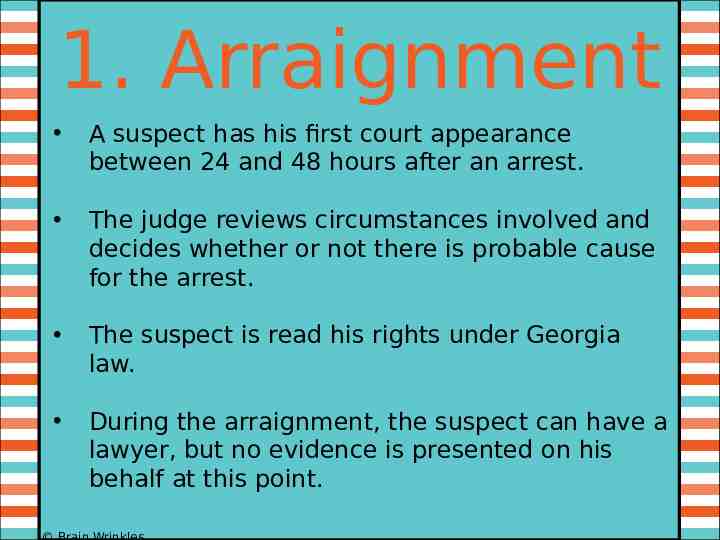
1. Arraignment A suspect has his first court appearance between 24 and 48 hours after an arrest. The judge reviews circumstances involved and decides whether or not there is probable cause for the arrest. The suspect is read his rights under Georgia law. During the arraignment, the suspect can have a lawyer, but no evidence is presented on his behalf at this point.
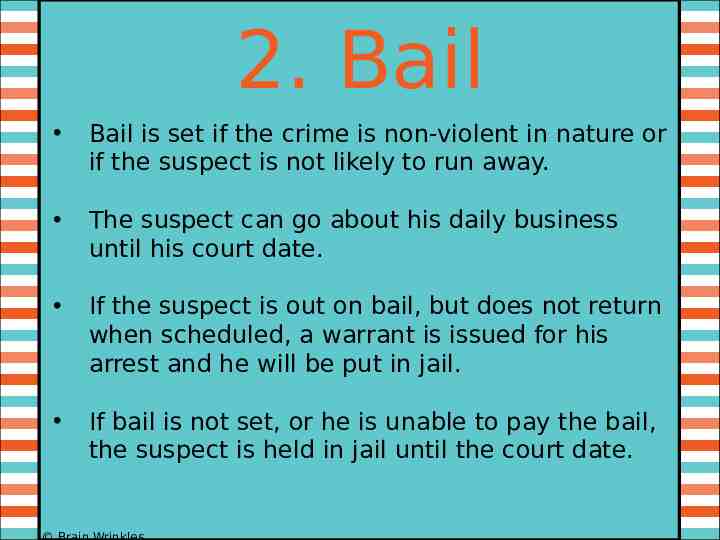
2. Bail Bail is set if the crime is non-violent in nature or if the suspect is not likely to run away. The suspect can go about his daily business until his court date. If the suspect is out on bail, but does not return when scheduled, a warrant is issued for his arrest and he will be put in jail. If bail is not set, or he is unable to pay the bail, the suspect is held in jail until the court date.
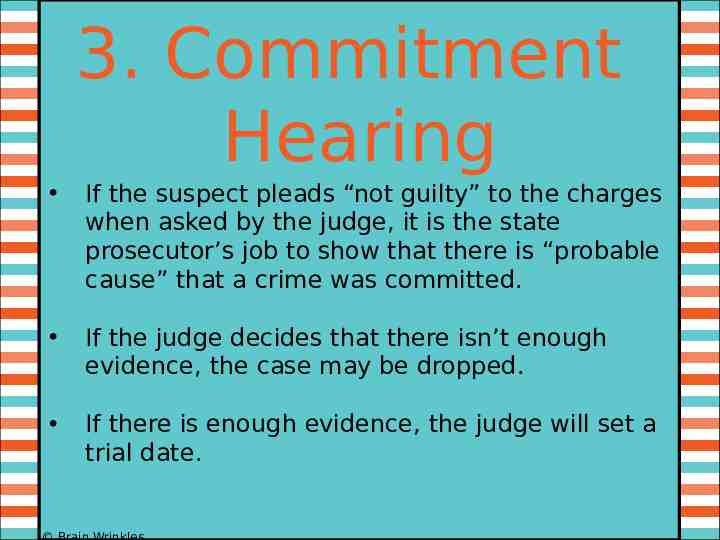
3. Commitment Hearing If the suspect pleads “not guilty” to the charges when asked by the judge, it is the state prosecutor’s job to show that there is “probable cause” that a crime was committed. If the judge decides that there isn’t enough evidence, the case may be dropped. If there is enough evidence, the judge will set a trial date.
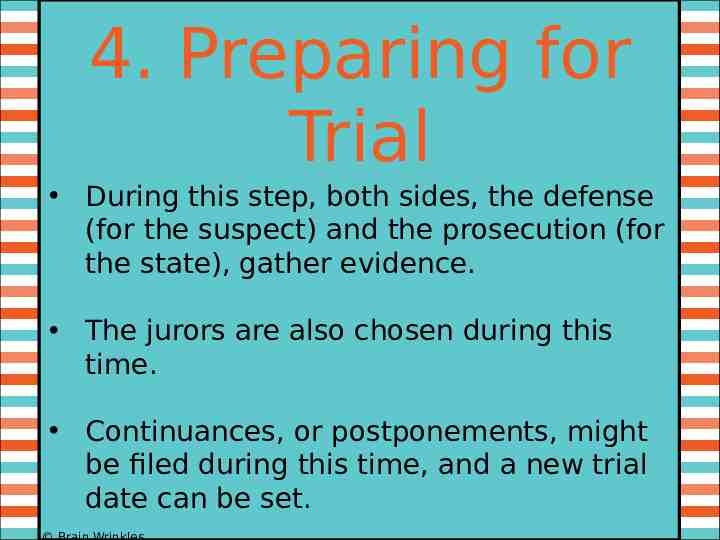
4. Preparing for Trial During this step, both sides, the defense (for the suspect) and the prosecution (for the state), gather evidence. The jurors are also chosen during this time. Continuances, or postponements, might be filed during this time, and a new trial date can be set.
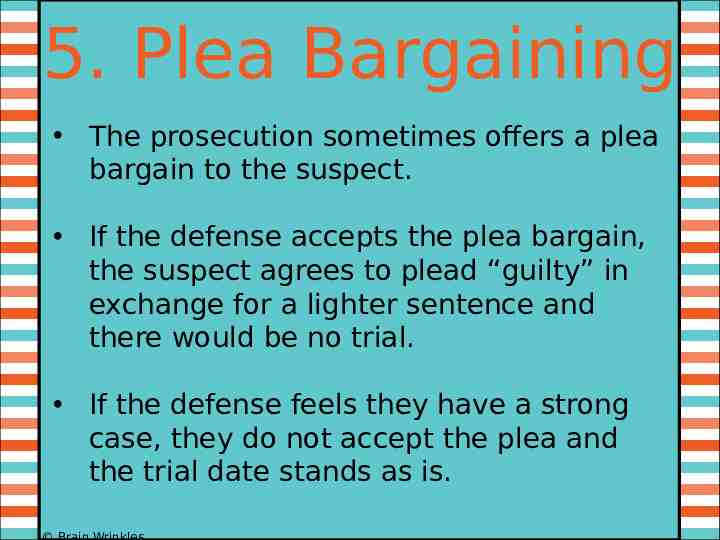
5. Plea Bargaining The prosecution sometimes offers a plea bargain to the suspect. If the defense accepts the plea bargain, the suspect agrees to plead “guilty” in exchange for a lighter sentence and there would be no trial. If the defense feels they have a strong case, they do not accept the plea and the trial date stands as is.
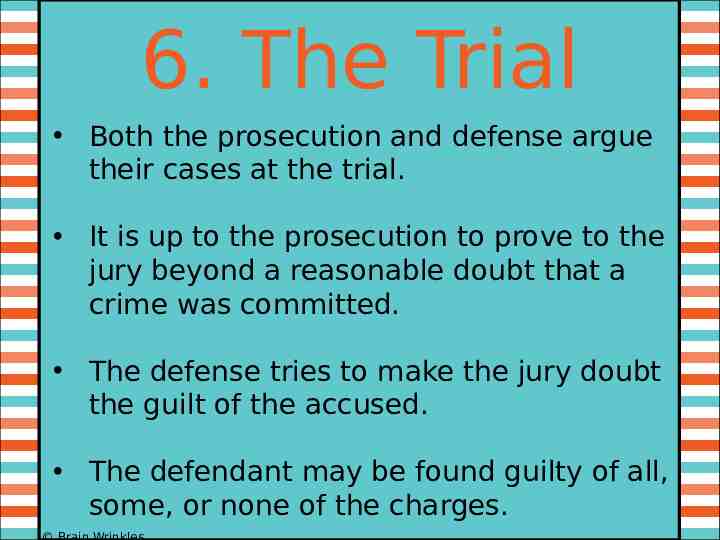
6. The Trial Both the prosecution and defense argue their cases at the trial. It is up to the prosecution to prove to the jury beyond a reasonable doubt that a crime was committed. The defense tries to make the jury doubt the guilt of the accused. The defendant may be found guilty of all, some, or none of the charges.
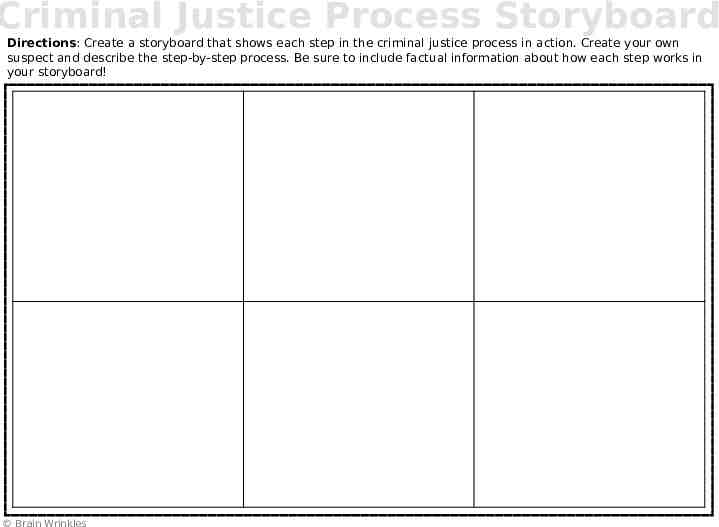
Criminal Justice Process Storyboard Directions: Create a storyboard that shows each step in the criminal justice process in action. Create your own suspect and describe the step-by-step process. Be sure to include factual information about how each step works in your storyboard! Brain Wrinkles
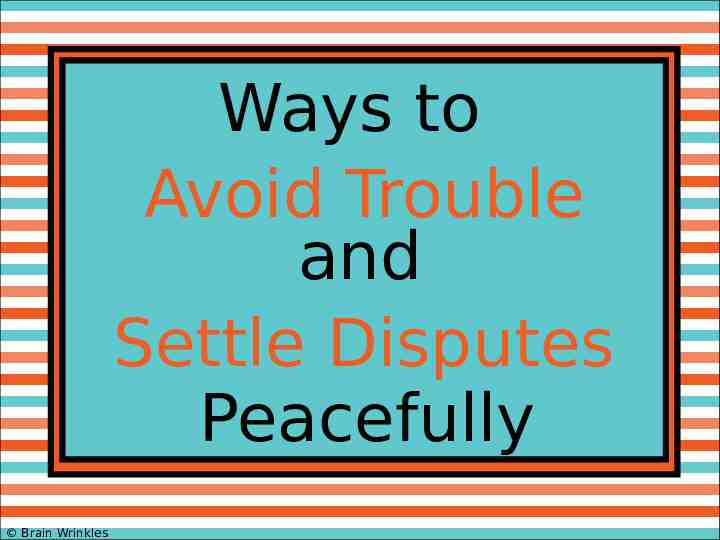
Ways to Avoid Trouble and Settle Disputes Peacefully Brain Wrinkles
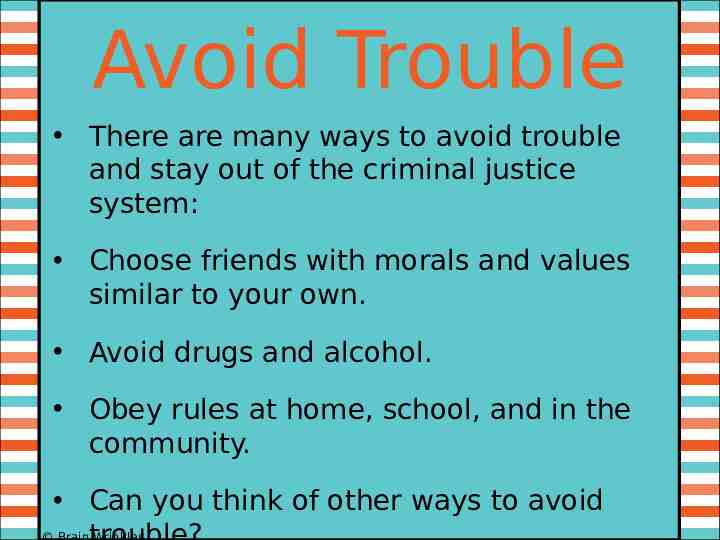
Avoid Trouble There are many ways to avoid trouble and stay out of the criminal justice system: Choose friends with morals and values similar to your own. Avoid drugs and alcohol. Obey rules at home, school, and in the community. Can you think of other ways to avoid
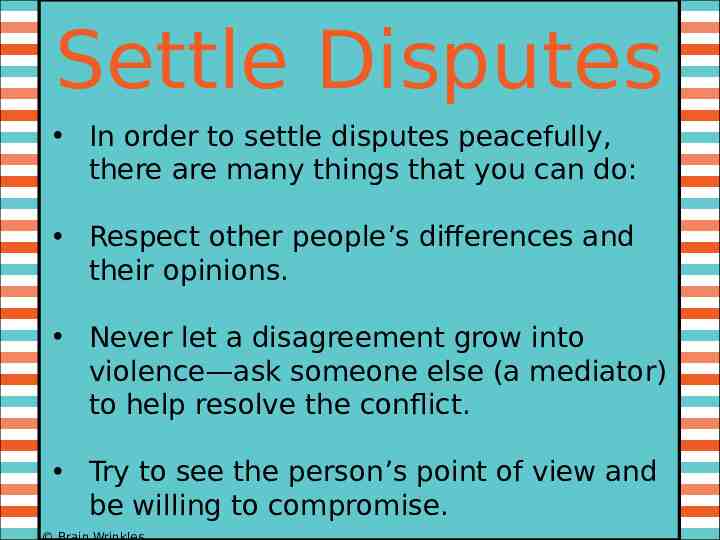
Settle Disputes In order to settle disputes peacefully, there are many things that you can do: Respect other people’s differences and their opinions. Never let a disagreement grow into violence—ask someone else (a mediator) to help resolve the conflict. Try to see the person’s point of view and be willing to compromise.
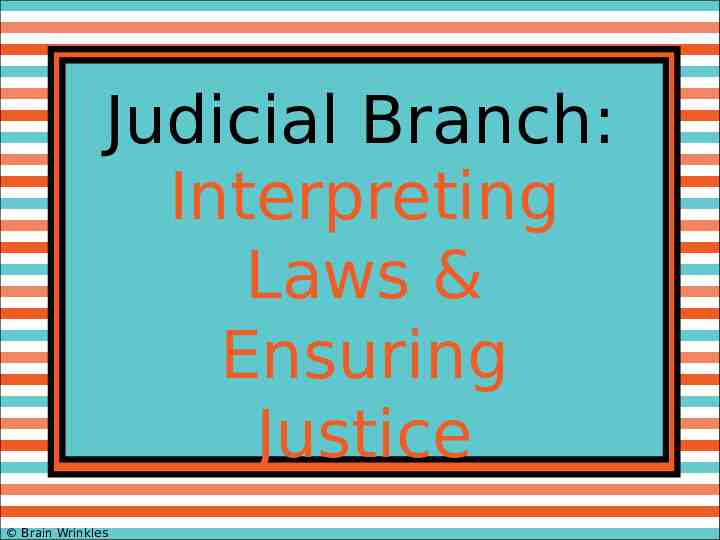
Judicial Branch: Interpreting Laws & Ensuring Justice Brain Wrinkles
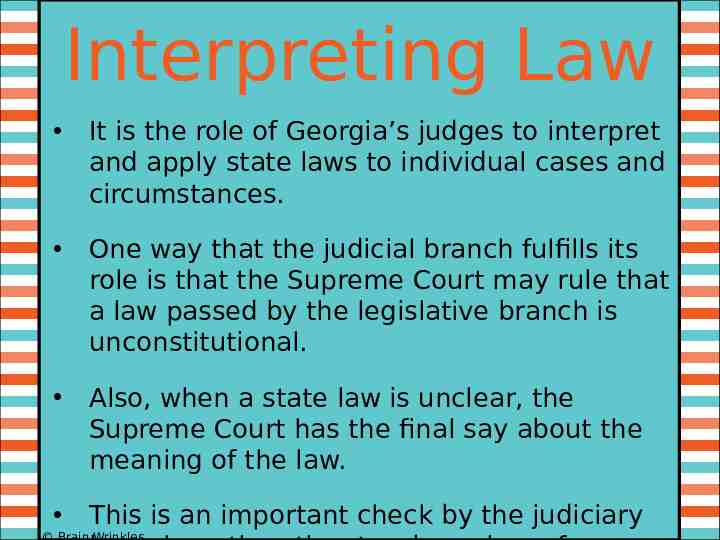
Interpreting Law It is the role of Georgia’s judges to interpret and apply state laws to individual cases and circumstances. One way that the judicial branch fulfills its role is that the Supreme Court may rule that a law passed by the legislative branch is unconstitutional. Also, when a state law is unclear, the Supreme Court has the final say about the meaning of the law. This is an important check by the judiciary
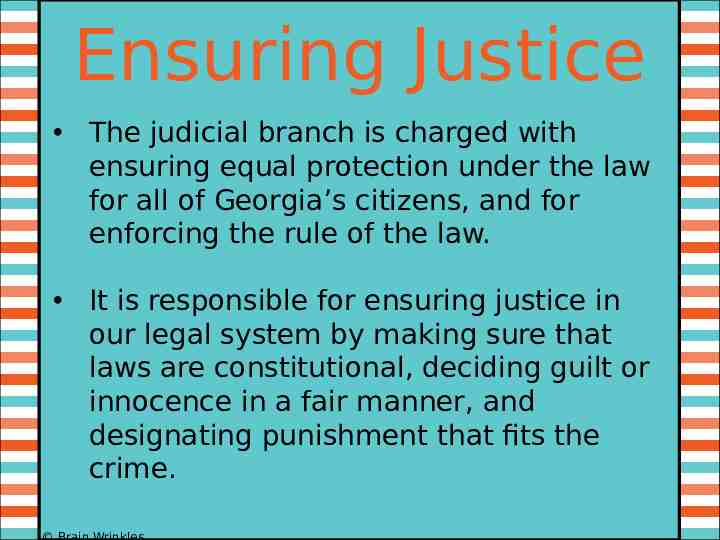
Ensuring Justice The judicial branch is charged with ensuring equal protection under the law for all of Georgia’s citizens, and for enforcing the rule of the law. It is responsible for ensuring justice in our legal system by making sure that laws are constitutional, deciding guilt or innocence in a fair manner, and designating punishment that fits the crime.
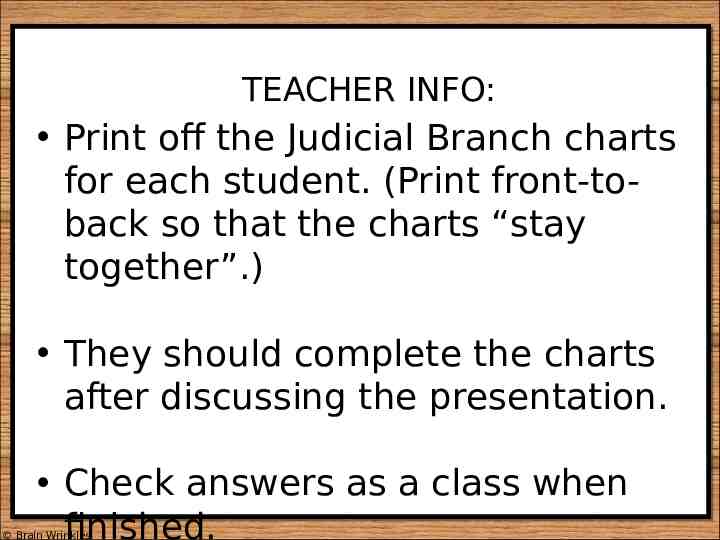
TEACHER INFO: Print off the Judicial Branch charts for each student. (Print front-toback so that the charts “stay together”.) They should complete the charts after discussing the presentation. Check answers as a class when finished. Brain Wrinkles
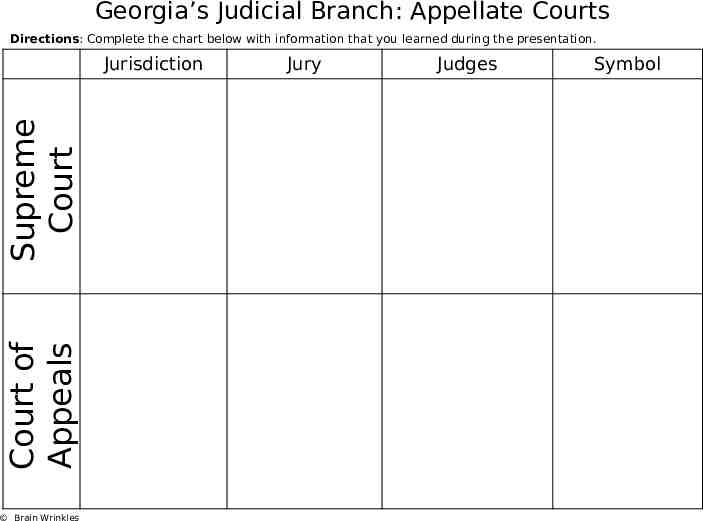
Georgia’s Judicial Branch: Appellate Courts Directions: Complete the chart below with information that you learned during the presentation. Court of Appeals Supreme Court Jurisdiction Brain Wrinkles Jury Judges Symbol
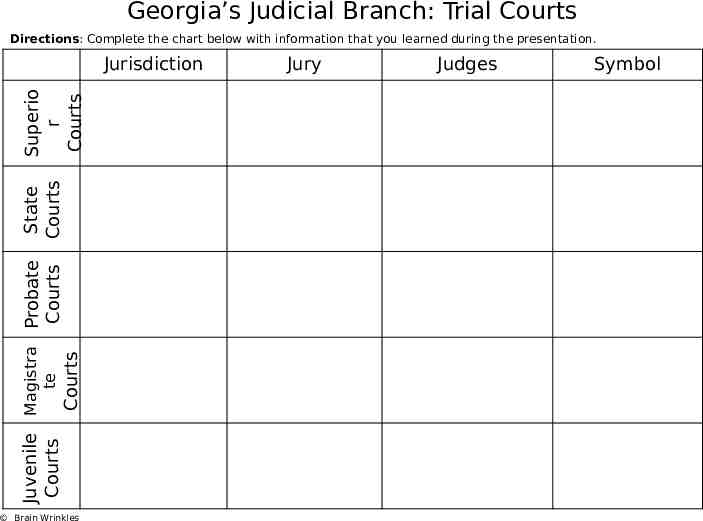
Georgia’s Judicial Branch: Trial Courts Directions: Complete the chart below with information that you learned during the presentation. Juvenile Magistra Probate te Courts Courts Courts State Courts Superio r Courts Jurisdiction Brain Wrinkles Jury Judges Symbol
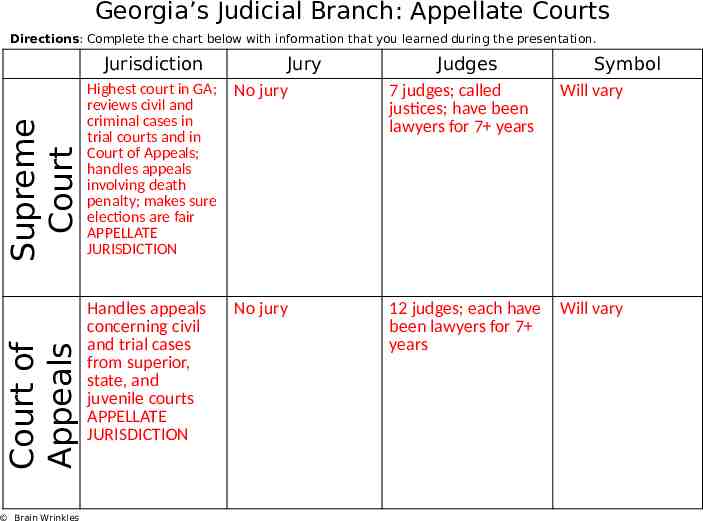
Georgia’s Judicial Branch: Appellate Courts Directions: Complete the chart below with information that you learned during the presentation. Court of Appeals Supreme Court Jurisdiction Brain Wrinkles Jury Highest court in GA; No jury Judges 7 judges; called justices; have been lawyers for 7 years Symbol Will vary Handles appeals concerning civil and trial cases from superior, state, and juvenile courts APPELLATE JURISDICTION 12 judges; each have been lawyers for 7 years Will vary reviews civil and criminal cases in trial courts and in Court of Appeals; handles appeals involving death penalty; makes sure elections are fair APPELLATE JURISDICTION No jury
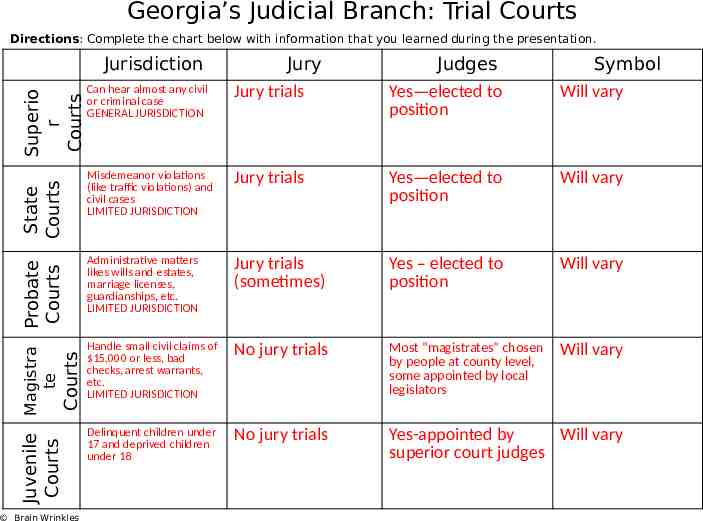
Georgia’s Judicial Branch: Trial Courts Directions: Complete the chart below with information that you learned during the presentation. Juvenile Magistra Probate te Courts Courts Courts State Courts Superio r Courts Jurisdiction Brain Wrinkles Jury Judges Symbol Can hear almost any civil or criminal case GENERAL JURISDICTION Jury trials Yes—elected to position Will vary Misdemeanor violations (like traffic violations) and civil cases LIMITED JURISDICTION Jury trials Yes—elected to position Will vary Administrative matters likes wills and estates, marriage licenses, guardianships, etc. LIMITED JURISDICTION Jury trials (sometimes) Yes – elected to position Will vary Handle small civil claims of 15,000 or less, bad checks, arrest warrants, etc. LIMITED JURISDICTION No jury trials Most “magistrates” chosen by people at county level, some appointed by local legislators Will vary Delinquent children under 17 and deprived children under 18 No jury trials Yes-appointed by Will vary superior court judges
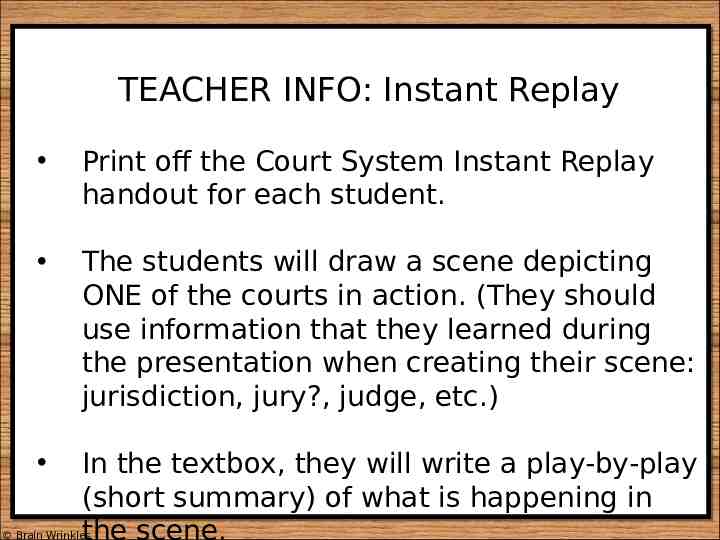
TEACHER INFO: Instant Replay Print off the Court System Instant Replay handout for each student. The students will draw a scene depicting ONE of the courts in action. (They should use information that they learned during the presentation when creating their scene: jurisdiction, jury?, judge, etc.) In the textbox, they will write a play-by-play (short summary) of what is happening in Brain Wrinkles
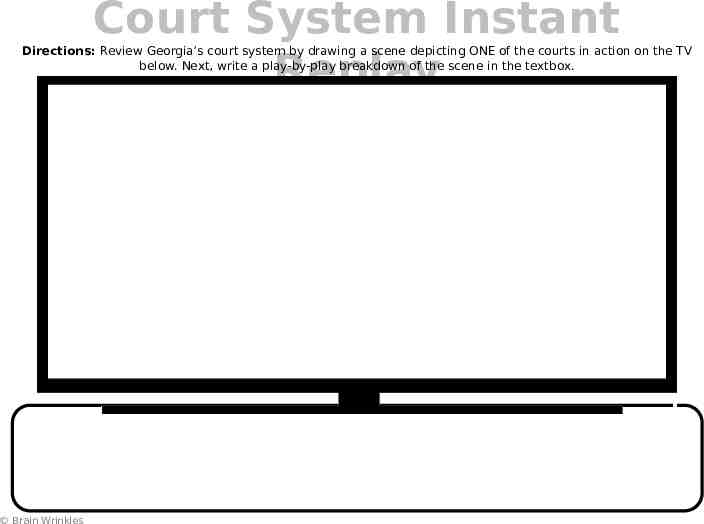
Court System Instant Replay Directions: Review Georgia’s court system by drawing a scene depicting ONE of the courts in action on the TV below. Next, write a play-by-play breakdown of the scene in the textbox. Brain Wrinkles
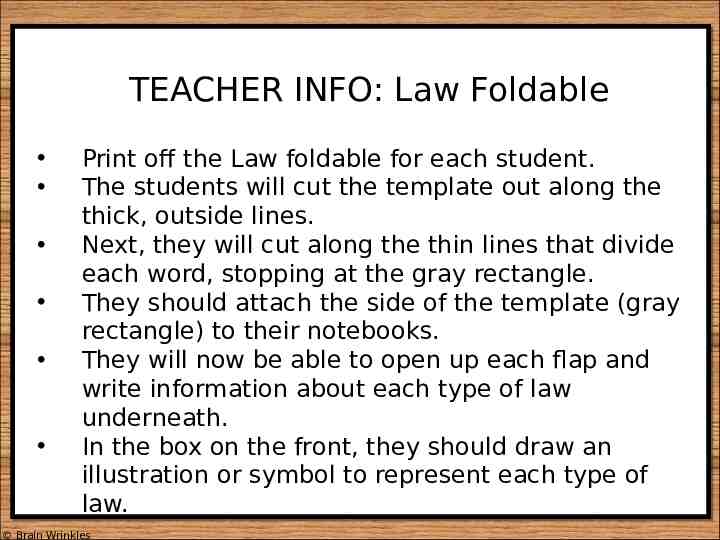
TEACHER INFO: Law Foldable Print off the Law foldable for each student. The students will cut the template out along the thick, outside lines. Next, they will cut along the thin lines that divide each word, stopping at the gray rectangle. They should attach the side of the template (gray rectangle) to their notebooks. They will now be able to open up each flap and write information about each type of law underneath. In the box on the front, they should draw an illustration or symbol to represent each type of law. Brain Wrinkles
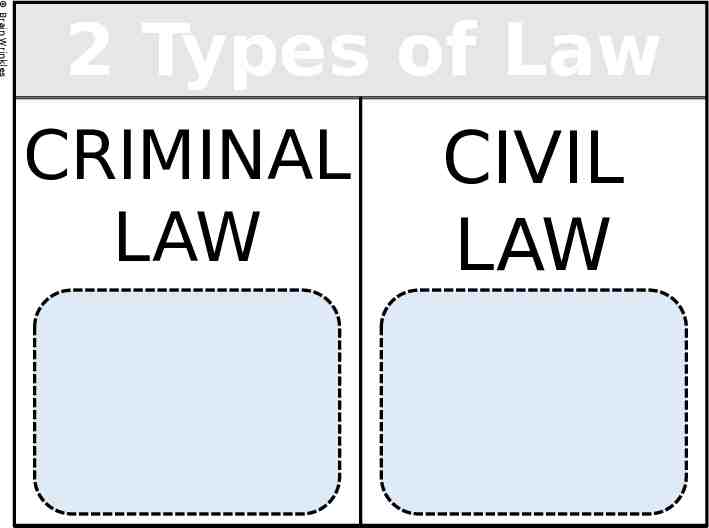
Brain Wrinkles 2 Types of Law CRIMINAL CIVIL LAW LAW
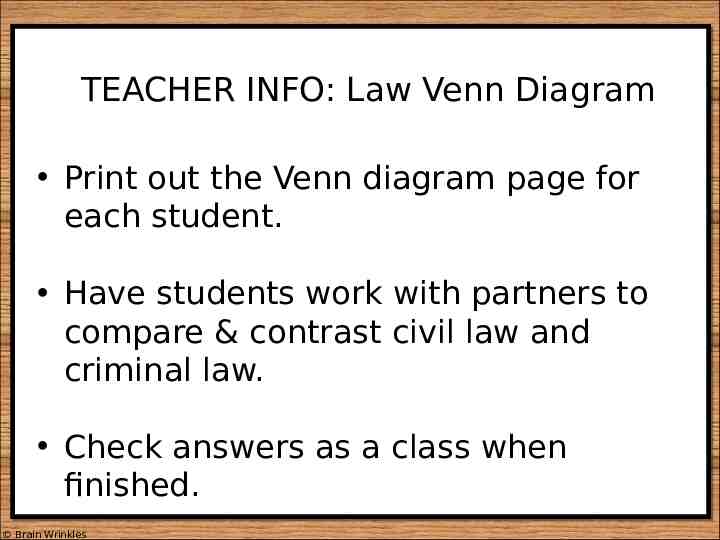
TEACHER INFO: Law Venn Diagram Print out the Venn diagram page for each student. Have students work with partners to compare & contrast civil law and criminal law. Check answers as a class when finished. Brain Wrinkles
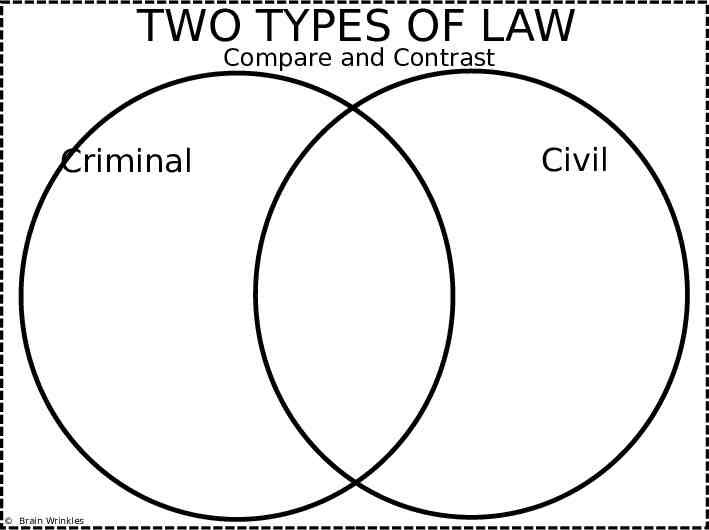
TWO TYPES OF LAW Compare and Contrast Criminal Brain Wrinkles Civil
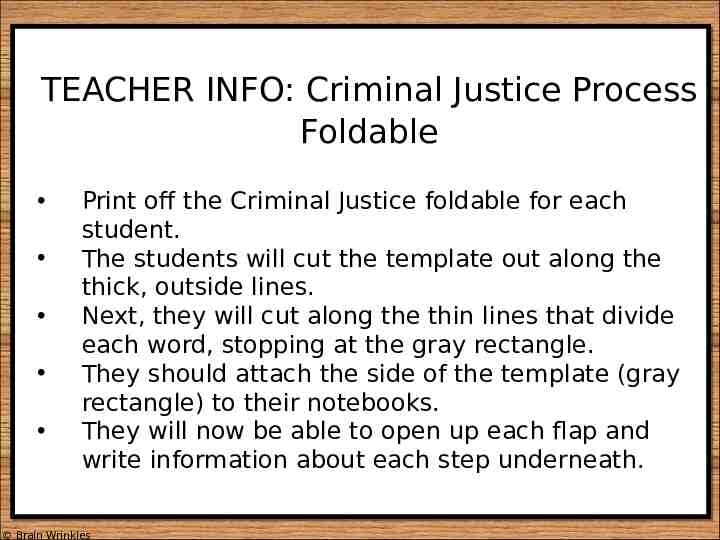
TEACHER INFO: Criminal Justice Process Foldable Print off the Criminal Justice foldable for each student. The students will cut the template out along the thick, outside lines. Next, they will cut along the thin lines that divide each word, stopping at the gray rectangle. They should attach the side of the template (gray rectangle) to their notebooks. They will now be able to open up each flap and write information about each step underneath. Brain Wrinkles
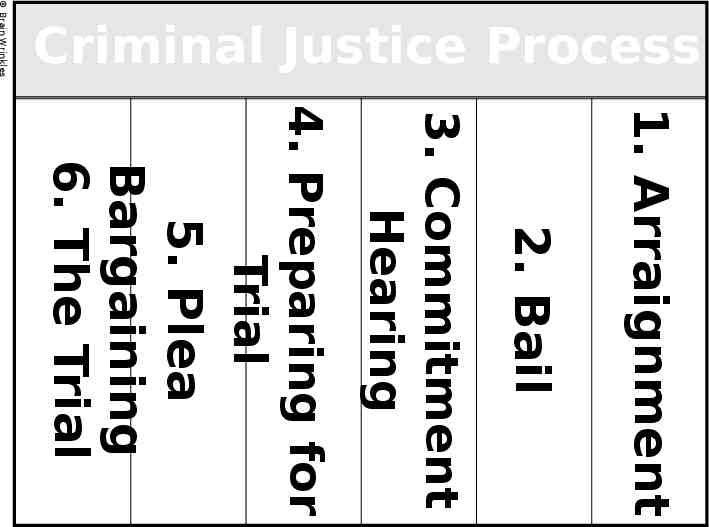
Brain Wrinkles Criminal Justice Process 1. Arraignment 2. Bail 3. Commitment Hearing 4. Preparing for Trial 5. Plea Bargaining 6. The Trial
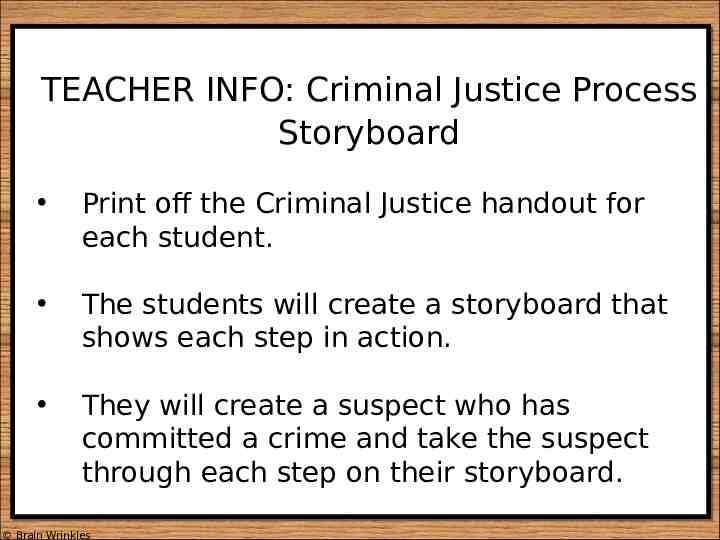
TEACHER INFO: Criminal Justice Process Storyboard Print off the Criminal Justice handout for each student. The students will create a storyboard that shows each step in action. They will create a suspect who has committed a crime and take the suspect through each step on their storyboard. Brain Wrinkles
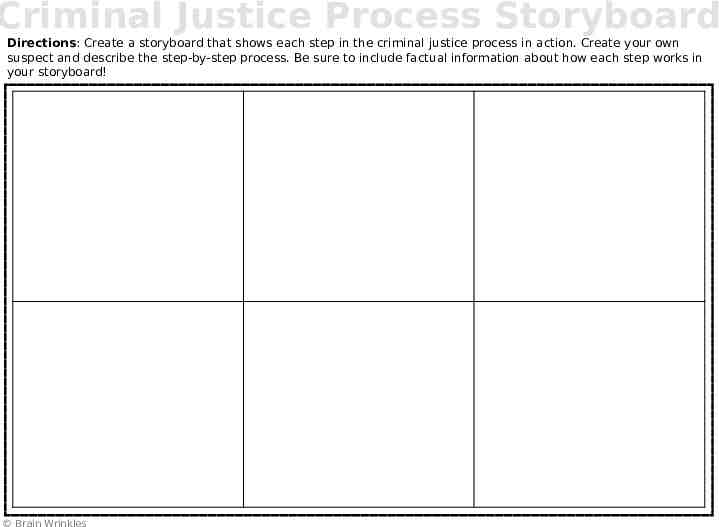
Criminal Justice Process Storyboard Directions: Create a storyboard that shows each step in the criminal justice process in action. Create your own suspect and describe the step-by-step process. Be sure to include factual information about how each step works in your storyboard! Brain Wrinkles
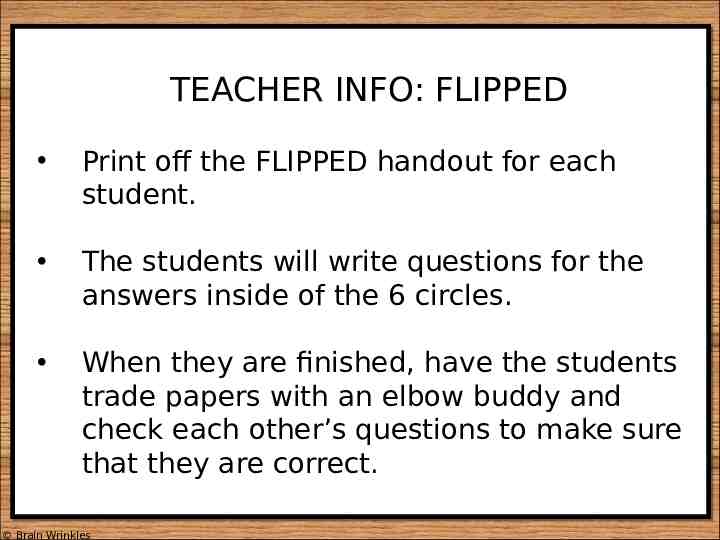
TEACHER INFO: FLIPPED Print off the FLIPPED handout for each student. The students will write questions for the answers inside of the 6 circles. When they are finished, have the students trade papers with an elbow buddy and check each other’s questions to make sure that they are correct. Brain Wrinkles
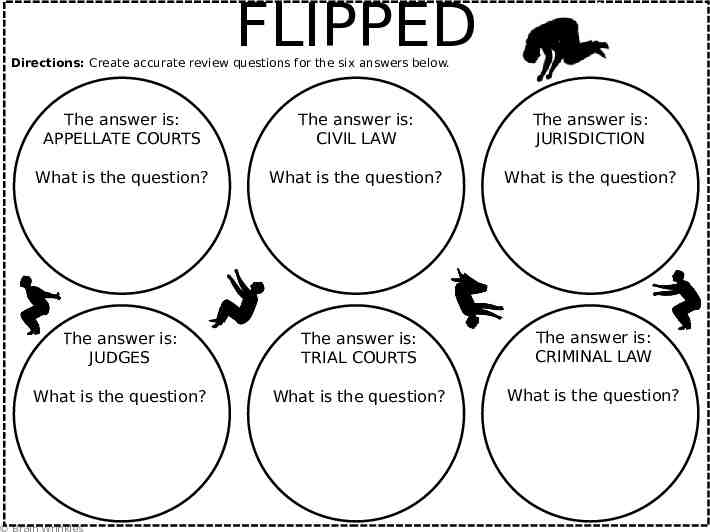
FLIPPED Directions: Create accurate review questions for the six answers below. The answer is: APPELLATE COURTS The answer is: CIVIL LAW The answer is: JURISDICTION What is the question? What is the question? What is the question? The answer is: JUDGES The answer is: TRIAL COURTS The answer is: CRIMINAL LAW What is the question? What is the question? What is the question? Brain Wrinkles
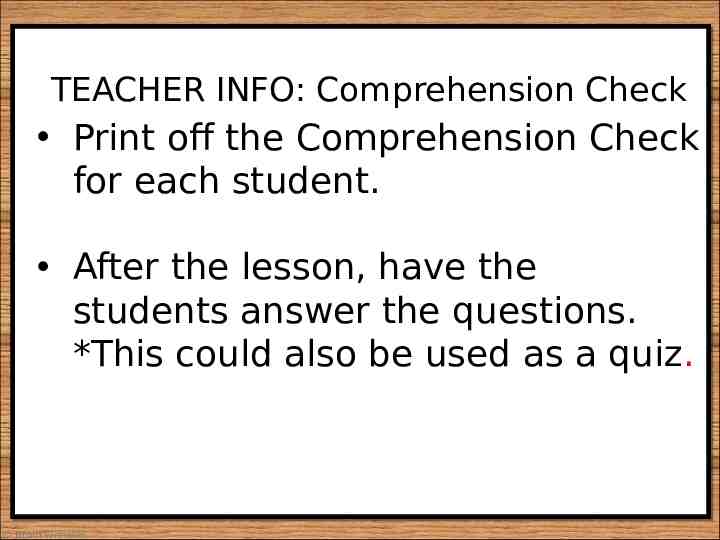
TEACHER INFO: Comprehension Check Print off the Comprehension Check for each student. After the lesson, have the students answer the questions. *This could also be used as a quiz. Brain Wrinkles
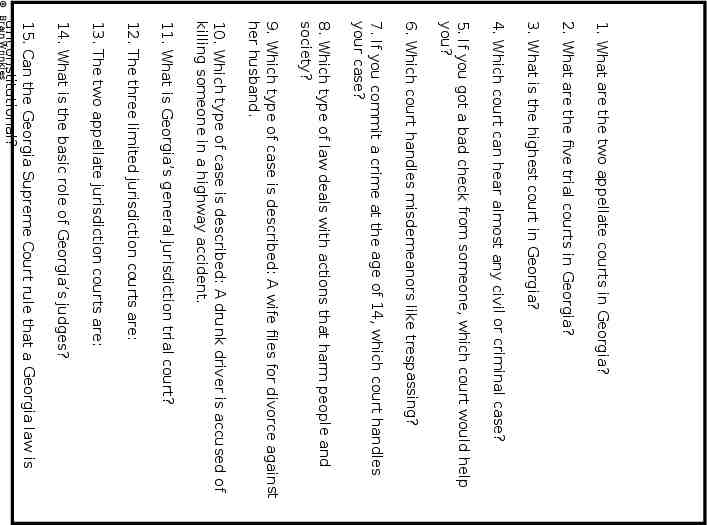
Georgia’s Judicial Branch Comprehension Check 1. What are the two appellate courts in Georgia? 2. What are the five trial courts in Georgia? 3. What is the highest court in Georgia? 4. Which court can hear almost any civil or criminal case? 5. If you got a bad check from someone, which court would help you? 6. Which court handles misdemeanors like trespassing? 7. If you commit a crime at the age of 14, which court handles your case? 8. Which type of law deals with actions that harm people and society? 9. Which type of case is described: A wife files for divorce against her husband. 10. Which type of case is described: A drunk driver is accused of killing someone in a highway accident. 11. What is Georgia’s general jurisdiction trial court? 12. The three limited jurisdiction courts are: 13. The two appellate jurisdiction courts are: 14. What is the basic role of Georgia’s judges? 15. Can the Georgia Supreme Court rule that a Georgia law is unconstitutional? Brain Wrinkles
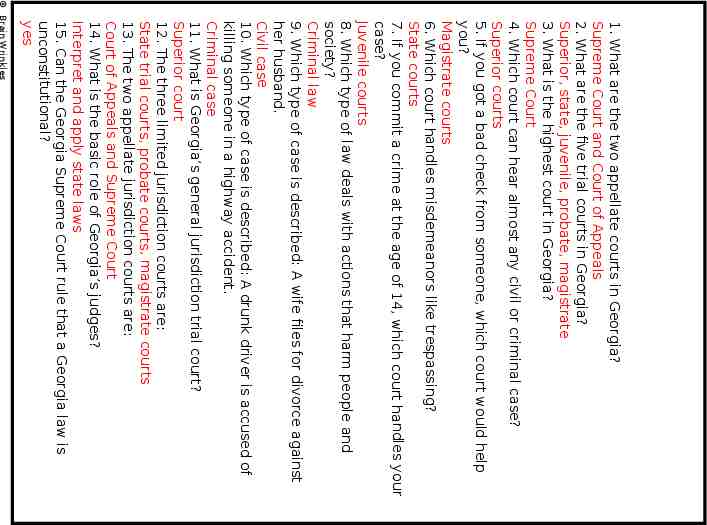
Georgia’s Judicial Branch Comprehension Check 1. What are the two appellate courts in Georgia? Supreme Court and Court of Appeals 2. What are the five trial courts in Georgia? Superior, state, juvenile, probate, magistrate 3. What is the highest court in Georgia? Supreme Court 4. Which court can hear almost any civil or criminal case? Superior courts 5. If you got a bad check from someone, which court would help you? Magistrate courts 6. Which court handles misdemeanors like trespassing? State courts 7. If you commit a crime at the age of 14, which court handles your case? Juvenile courts 8. Which type of law deals with actions that harm people and society? Criminal law 9. Which type of case is described: A wife files for divorce against her husband. Civil case 10. Which type of case is described: A drunk driver is accused of killing someone in a highway accident. Criminal case 11. What is Georgia’s general jurisdiction trial court? Superior court 12. The three limited jurisdiction courts are: State trial courts, probate courts, magistrate courts 13. The two appellate jurisdiction courts are: Court of Appeals and Supreme Court 14. What is the basic role of Georgia’s judges? Interpret and apply state laws 15. Can the Georgia Supreme Court rule that a Georgia law is unconstitutional? yes Brain Wrinkles
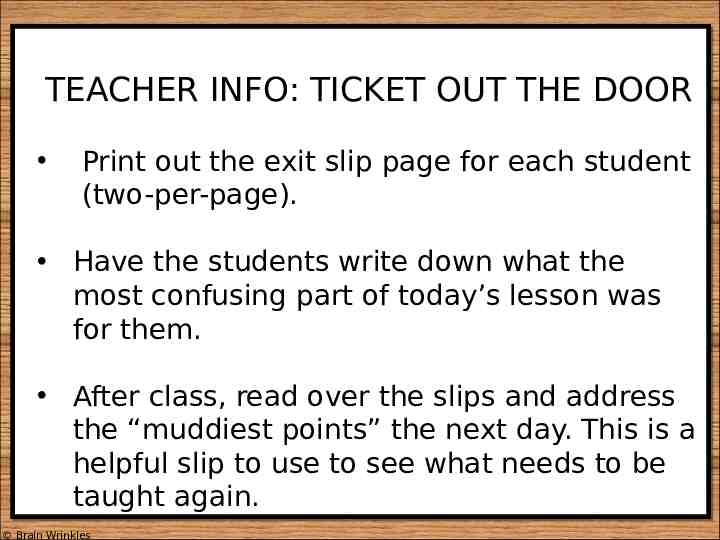
TEACHER INFO: TICKET OUT THE DOOR Print out the exit slip page for each student (two-per-page). Have the students write down what the most confusing part of today’s lesson was for them. After class, read over the slips and address the “muddiest points” the next day. This is a helpful slip to use to see what needs to be taught again. Brain Wrinkles
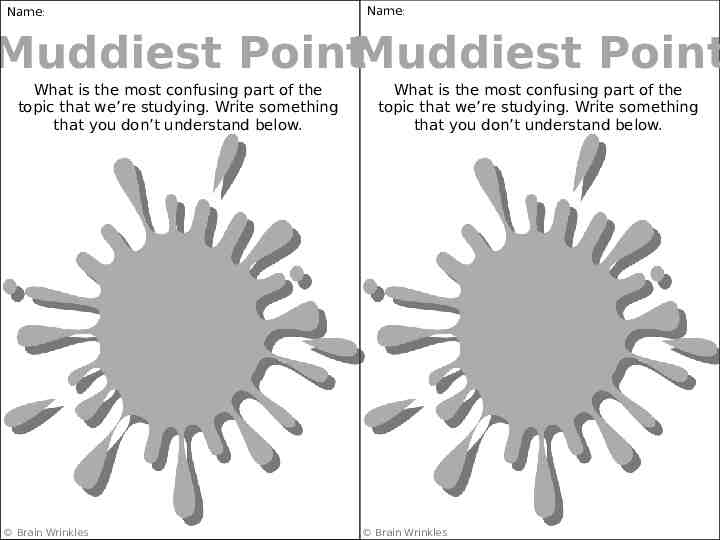
Name: Name: Muddiest PointMuddiest Point What is the most confusing part of the topic that we’re studying. Write something that you don’t understand below. Brain Wrinkles What is the most confusing part of the topic that we’re studying. Write something that you don’t understand below. Brain Wrinkles

Thank You! Thank you so much for downloading this file. I sincerely hope you find it helpful and that your students learn a lot from it! I look forward to reading your feedback in my store. If you like this file, you might want to check out some of my other products that teach social studies topics in creative, engaging, and hands-on ways. Best wishes, Ansley at Brain Wrinkles
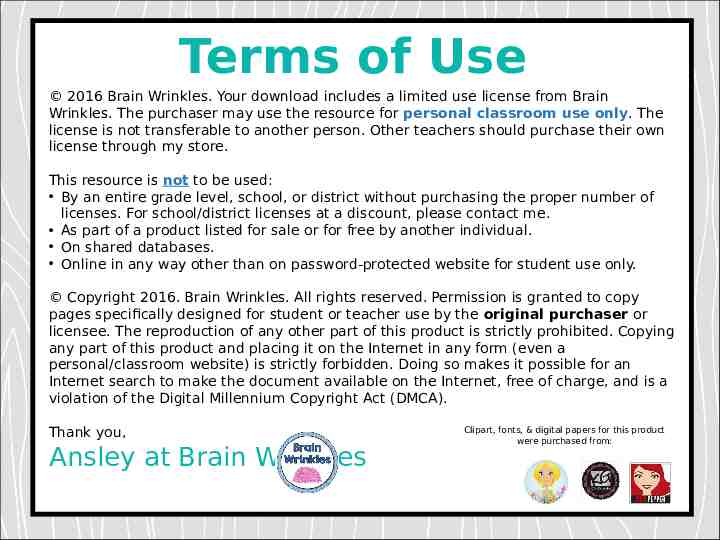
Terms of Use 2016 Brain Wrinkles. Your download includes a limited use license from Brain Wrinkles. The purchaser may use the resource for personal classroom use only. The license is not transferable to another person. Other teachers should purchase their own license through my store. This resource is not to be used: By an entire grade level, school, or district without purchasing the proper number of licenses. For school/district licenses at a discount, please contact me. As part of a product listed for sale or for free by another individual. On shared databases. Online in any way other than on password-protected website for student use only. Copyright 2016. Brain Wrinkles. All rights reserved. Permission is granted to copy pages specifically designed for student or teacher use by the original purchaser or licensee. The reproduction of any other part of this product is strictly prohibited. Copying any part of this product and placing it on the Internet in any form (even a personal/classroom website) is strictly forbidden. Doing so makes it possible for an Internet search to make the document available on the Internet, free of charge, and is a violation of the Digital Millennium Copyright Act (DMCA). Thank you, Ansley at Brain Wrinkles Clipart, fonts, & digital papers for this product were purchased from:

